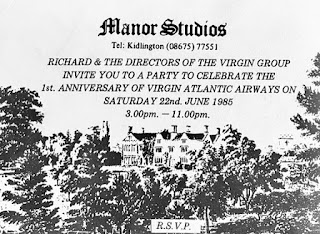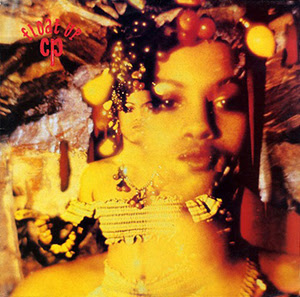Lee Ellen Newman: Press Goddess
Charisma Records (c.1983)
I.
As Paul Gorman reminds us in his excellent biography, when Malcolm McLaren presented his groundbreaking new record 'Buffalo Gals' to the executives at Charisma Records in the autum of 1982, excitedly telling them how kids "'danced on their heads to this beat in the middle of the streets of New York'" [1], he may have anticipated a little bemusement, but not such angry incomprehension and resistance.
Unfortunately, however, that the track was "a stylistic aural collage to rival McLaren's work in fashion, interiors
and design was entirely lost on the record company ..." [2]
The head of promotions declared that it was not music and refused to take it to the radio stations; poor old Tony Stratton-Smith wondered how he was going to recuperate at least some of the monies paid out in advance; and, according to McLaren, the only person who stood up for him was "'the press lady: a young American, new in her job'" [3].
II.
The question becomes: Who was that young American press lady?
And it's a question I'm happy to answer; not only because today happens to be her birthday, but because Lee Ellen Newman is one of the people I will always be grateful to.
For
she it was who advised me on the importance of building a wide network
of contacts, of cultivating a likeable public image, and of remaining
calm under pressure (even if, unfortunately, I never quite managed to
accomplish these things to her high professional standard).
And she it was who taught me how to write concisely and persuasively and to master the art of what is known in the PR world as strategic storytelling;
i.e., the deployment of a cleverly structured (and seductive) narrative
in order to appeal to a target audience and achieve a specific goal [4].
And happy birthday!
Notes
[1] Malcolm McLaren, quoted by Paul Gorman, in The Life and Times of Malcolm McLaren (Constable, 2020), p. 517.
[2] Paul Gorman, The Life and Times of Malcolm McLaren, p. 516.
[3] Malcolm McLaren, quoted by Paul Gorman in The Life and Times of Malcolm McLaren, p. 517.
As Gorman goes on to elucidate, Charisma seriously considered taking legal action against McLaren on the grounds that he had grossly overspent and that "he was in breach of the contractual obligation to deliver music of acceptable commercial value".
However, 'Buffalo Gals' became a top ten hit in the UK and other countries and this "proved sufficient for Charisma to back off from its legal posturing" and press on with release of McLaren's debut album Duck Rock (1983) and other singles taken from it, including McLaren's biggest selling and highest charting hit, 'Double Dutch'.
Relations between the artist and the record label failed to recover, however, even though Charisma would release two further McLaren albums: Fans (1984), which fused opera with R&B; and Swamp Thing (1985), composed of out-takes recorded between 1982 and 1984, which I like, but everyone else hates; McLaren's version of 'Swingin' the Alphabet' ('B. I. Bikki') is even more hilarious than that given us by the Three Stooges in their 1938 short film Violent is the Word for Curly (dir. Charley Chase): click here.
[4] It may sound a bit cynical and manipulative and some might view strategic
storytelling as a form of what is called by our political friends spin. In my experience, however, it's more a game whereby you give a journalist,
for example, what they want for a good feature and they give you what
you need in
order create excitement around the artist you are representing and boost
sales of whatever it is they're promoting. In other words, strategic storytelling is an exercise in backscratching rather than backstabbing and the wilful deception of others.
Readers who wish to know more about Buffalo Gals should see the post entitled 'And They Dance by the Light of the Moon ...' (19 Feb 2019): click here.
Readers who think they might enjoy a post in which I reminisce about my time with Lee Ellen at Charisma Records should see the post entitled 'Memories of Summer '84: Charisma' (17 July 2024): click here.














